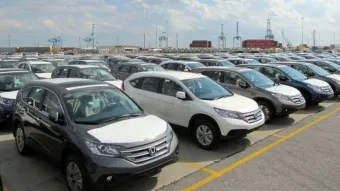Following the increased customs duties on aluminum imports to the US, a classification error could lead to penalties, delays, and even seizures. This is the view of many experts involved in trade with the US.
The increase in customs duties on the import of aluminum and its products to the US, which came into effect in February 2025, at a rate of 25%, along with reciprocal duties announced in early April, changes the rules of the game in the trade market with the US. Beneath the official statements and numbers, there is another, more complex change that industry experts call 'the hidden customs', meaning a consistent tightening in the approach of the US customs, which is expressed in a broader interpretation of the regulations, ambiguity around definitions, and ongoing uncertainty about the classification of products that include aluminum components - even if they are negligible.
In a conversation with Amit Chen, CEO of the international shipping company Unicargo, which specializes in operations with the American market, it emerges that the main risk today is not only in the official tax tariffs, but in the nature of enforcement. 'It's not the customs rate that should worry - it's the interpretation,' emphasizes Chen.
Amit Chen: 'The announcement in February 2025 was accompanied not only by an update of the tax rate - but also by an expansion of the definitions. Today, a lighting fixture with an aluminum frame, or a plastic toy with a small aluminum screw, may be considered a derivative product and require full payment of 25% customs - on the entire product, not just the component.'
Amit Chen: 'That's exactly the problem. It's no longer a matter of weight or value, but an interpretive question. Is the aluminum substantial? Functional? Does it give 'the main character' to the product? When there are no precise criteria, there is a lot of room for tightening - and customs does not hesitate to use it.'
Amit Chen: 'This is a real trap. An importer can send a product with a small aluminum screw, and find that the entire product is charged 25% customs - even though the screw is worth a dollar out of a hundred. Why? Because it was sent as part of the package, and customs determines that it is essential for functioning. This happens mainly when there is no clear division of value in the invoice or when no prior opinion (ruling) has been submitted from customs.'
Amit Chen: 'Beyond the immediate payment of taxes and fines, there is a real risk of delays in release, seizure of goods, and sometimes even a demand for retroactive interest payment. Worse - you may be caught as someone trying to cheat. And all this because of a screw.'
Amit Chen: 'First of all, do not rely on intuition. Every product needs to be examined with a 'regulatory eye'. It is important to prepare a precise breakdown of the content of the materials, to declare in advance and accurately on each component, and in cases of doubt - to turn in advance to the US customs to get an official opinion (ruling) that will determine the product classification and prevent surprises along the way. And mainly, to work with a team that understands the American spirit: not only what is written in the law, but how to interpret it.'
Chen adds that policy changes also have financial implications on the ongoing management of imports, particularly in relation to the annual 'bond' - the importer's financial commitment to the US customs. The sharp increase in tax payments leads many companies to discover that they are reaching an early exhaustion of the bond framework. The insurance companies accompanying the process are demanding these days an immediate increase in the volume and sometimes also cash guarantees - conditions that were not accepted until now. According to him, anyone who does not prepare for this in advance, may find himself in a delay in release - not because of a problem with the goods, but due to a financial limitation.
'Each case is examined on its own - and when everything is interpretive, experience determines,' concludes Chen. 'This is not a period in which you can rely on past habits or superficial comparisons. The most practical recommendation today is to examine each product with a regulatory eye, combining three professional factors: a classification consultant, an international trade lawyer, and a logistics partner with proven experience.'
US Customs Intensifies Regulations: Interpretation Over Tax Rate
US Customs' stricter regulations on aluminum imports could lead to penalties, delays, and seizures due to broader interpretation of regulations and ongoing uncertainty about product classification.
11:17 ,07.04.2025
-
Found it useful? Share
-
Share on Facebook
-
Share on X
-
Share on LinkedIn
-
Share via Email
-
Share on WhatsApp
-
Print Article
Related
 02.04.2025
02.04.2025
Malt Import License Requirement Lifted by Israel's Ministry of Economy
 02.04.2025
02.04.2025
Israel Cancels All Tariffs on US Goods
 10.03.2025
10.03.2025
16.8% Decline in Private Vehicle Imports in February 2025
 02.03.2025
02.03.2025
Third Phase of Import Reform Comes into Effect
 10.02.2025
10.02.2025
Sharp Decline in Private Vehicle Imports in Israel in January 2025
 10.04.2016
10.04.2016
Customs working schedule during the forthcoming Jewish Passover holiday


